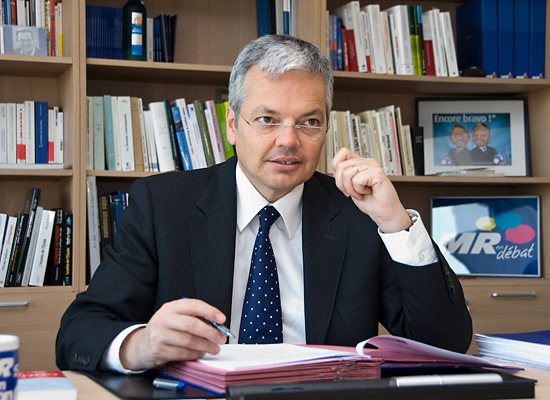Kourosh Ziabari – Tehran Times: The Belgian Foreign Minister Didier Reynders was one of the first European politicians who traveled to Iran following the election of Hassan Rouhani as Iran’s president in the June 2013 presidential elections. He traveled to Iran in late February to explore ways for expanding political, economic and cultural relations with Iran as the European Union member states become more willing and enthusiastic to reconstruct and improve their relations with Tehran.
In an exclusive interview with Tehran Times, the Belgian Foreign Minister Didier Reynders said that he thinks a final, comprehensive agreement over Iran’s nuclear program will be a win-win solution and that Iran’s trade with the European Union will significantly improve if the final agreement is secured.
“A nuclear agreement would be a win-win situation. It would result for Iran in having more access to world markets. However, we are not there yet. A clear and transparent agreement that can be verified is necessary. Belgian-Iranian trade would also benefit from this. A trade delegation will be in Iran at the end of April for an exploratory mission, which will give attending businessmen the chance to obtain a more in depth view of the potentialities of the Iranian market,” said Mr. Reynders.
Didier Reynders is a high-ranking Belgian politician and a member of the Mouvement Réformateur (MR). He was Deputy Prime Minister and Minister for Finance and Institutional Reforms in the first administration of Herman Van Rompuy. He has been the foreign minister since December 2011, preceded by Steven Vanackere.
What follows is the text of Tehran Times’ interview with Mr. Reynders upon his return to Brussels.
Q: Dr. Reynders; you were one of the first high-ranking European officials who traveled to Iran in about ten years. The new Iranian government has clearly voiced its willingness to expand constructive cooperation with the European Union member states and rebuild the tarnished and damaged relations of the past decade. Is Europe mutually willing for the reconstruction of bilateral ties with Iran? Overall, what do you make of the election of moderate President Hassan Rouhani and his foreign policy approach which is based on détente with the West?
A: I see my visit to Iran as a clear success. It gave me the opportunity to explain to the Iranian government how the international community sees the future of its relations with Iran. I expressed hope for a transparent nuclear agreement that can be verified. An agreement will bring more relations between us, on different levels. Mutual trust is a key factor in this process. I have noted the Iranian government’s commitment to negotiate seriously such an agreement. They expressed willingness to come to an agreement. I have no doubt that Iran’s future international standing and role will be greatly enhanced as a result of a nuclear agreement.
Q: The Geneva interim accord on Iran’s nuclear program stipulated the removal of some sanctions imposed against Iran in return for the freeze on certain portions of Iran’s nuclear activities. Do you think that the removal of sanctions, and the possible abolition of all the UNSC, U.S. and EU sanctions during the talks between Iran and the P5+1 for the comprehensive solution will lead to the increase in the mutual trade between Iran and Belgium? It’s said that a delegation of Belgian businessmen and merchants will be travelling to Iran in April. Are you and other European countries under pressure by the United States to limit trade transactions with Iran?
A: A nuclear agreement would be a win-win situation. It would result for Iran in having more access to world markets. However, we are not there yet. A clear and transparent agreement that can be verified is necessary. Belgian-Iranian trade would also benefit from this. A trade delegation will be in Iran at the end of April for an exploratory mission, which will give attending businessmen the chance to obtain a more in depth view of the potentialities of the Iranian market. But we have to be realistic; a significant increase in trade and investment will not be possible before a final agreement is signed.
The sanctions resulted from a decision of the international community who remains united on this matter. There is no disagreement between the EU and the U.S. The international community only wants to ensure that Iran is in compliance of its NPT commitments.
Q: What’s the EU and Belgium’s approach toward the humanitarian cost of the sanctions imposed against Iran, especially the sanctions which make it impossible for the ordinary Iranians to access medicine, foodstuff and other daily consumer goods? Is there any plan underway to ease such sanctions and contribute to the improvement of the livelihoods of the Iranian citizens?
A: Belgium is particularly aware of human costs of some political decisions. I refer e.g. to Syria where my country is a frontrunner in trying to reduce humanitarian costs. Concerning the sanctions on Iran, I draw your attention on the fact that it is not a general trade embargo and that some goods such as foodstuff and medicine are not targeted. Furthermore, in the provisional agreement, several sanctions were suspended, such as the sanctions on insurance and transport of oil, export of petrochemical goods and trade in precious metals. Moreover, a new financial channel for trade in humanitarian goods is foreseen and the ceiling for financial transactions has been increased tenfold.
This interview was originally published by Tehran Times daily.

